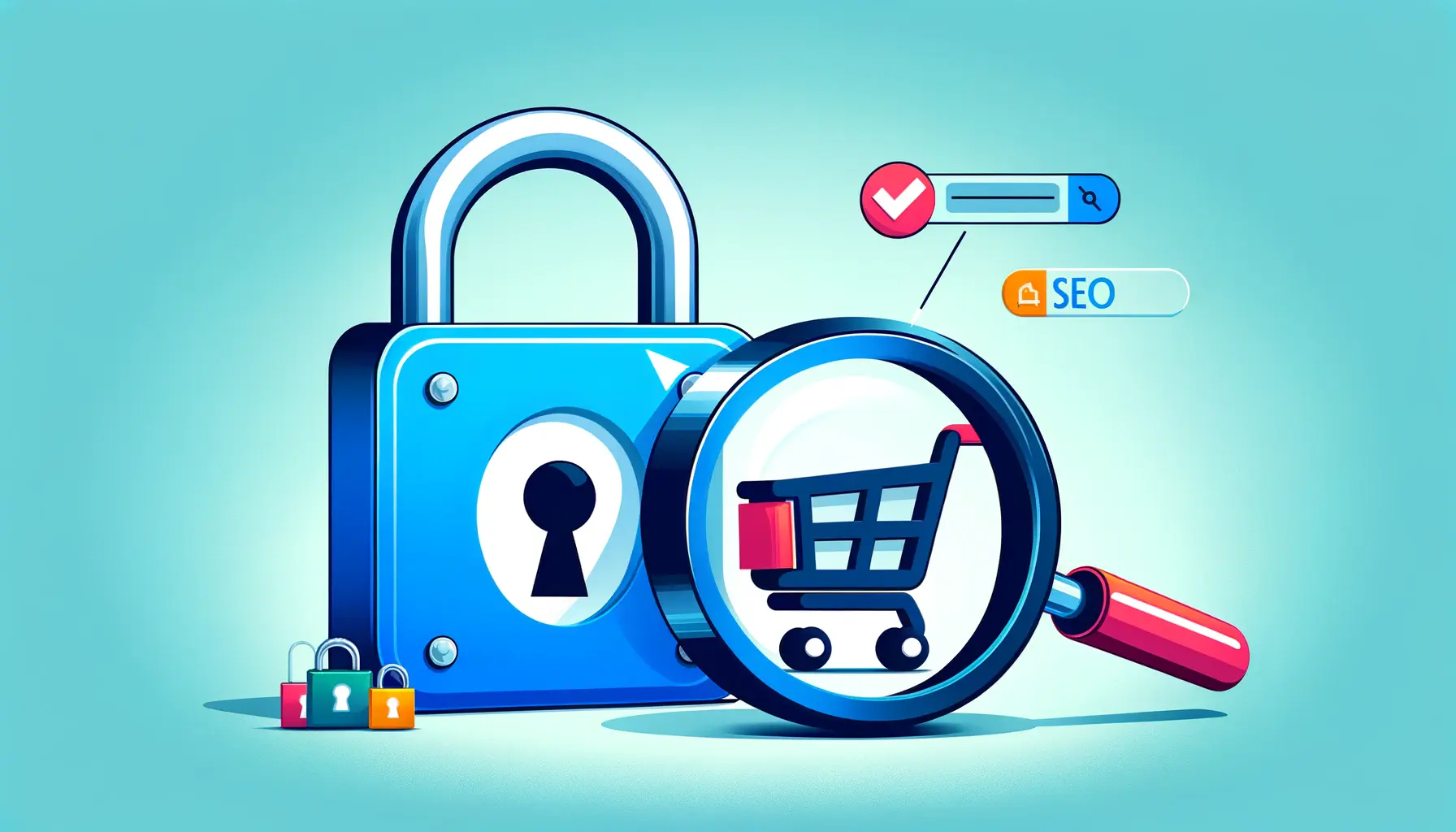In today’s digital age, the security of a website is not just a matter of protecting data and maintaining the trust of visitors but also plays a crucial role in search engine optimization (SEO).
As search engines like Google continue to prioritize user experience, the security of a website has become a significant factor in determining its ranking on search results pages.
This intertwining of security and SEO underscores the importance for professional services to adopt robust security measures not only to safeguard their online presence but also to enhance their visibility and credibility online.
Understanding the relationship between website security and SEO is essential for any business looking to thrive in the competitive digital marketplace.
Implementing effective security measures can prevent malicious attacks, data breaches, and other vulnerabilities that can tarnish a website’s reputation and its ranking on search engines.
By focusing on both security and SEO, professional services can ensure a secure, reliable online experience for their users while improving their site’s visibility and attracting more organic traffic.
- Understanding the Basics of Website Security
- Enhancing SEO Through Security Practices
- Common Threats to Website Security
- Implementing a Robust Security Framework
- Best Practices for Website Security Maintenance
- Advanced Security Technologies and Their SEO Benefits
- Creating a Culture of Security Within Your Organization
- Securing Success: The Intersection of Website Security and SEO
- FAQs on Security Measures to Boost Your Site’s SEO
Understanding the Basics of Website Security
Why Security Matters for Your Website
At the core of any successful online strategy lies the security of the website.
It’s the foundation upon which trust and reliability are built between a service and its clients.
In the realm of SEO for professional services, a secure website not only protects sensitive data but also signals to search engines that your site is a trustworthy source of information.
This trust is critical, as search engines aim to provide users with safe, reliable results.
A breach in security can lead to a drop in rankings, making it harder for potential clients to find your services.
Moreover, the implications of a security breach extend beyond just SEO.
They can result in significant financial losses, legal repercussions, and damage to your brand’s reputation.
In an era where data breaches are increasingly common, taking proactive steps to secure your website is not just recommended; it’s essential for maintaining the integrity of your professional services online.
Key Security Measures to Implement
Securing a website involves several key measures, each designed to protect against specific threats.
First and foremost, implementing HTTPS through an SSL certificate is non-negotiable.
This encrypts data transmitted between your website and its users, safeguarding sensitive information from being intercepted by malicious actors.
Additionally, keeping all software up to date, including your content management system (CMS), plugins, and themes, is crucial for closing security vulnerabilities.
Another vital measure is the use of strong, unique passwords and the implementation of two-factor authentication (2FA) for all administrative accounts.
These practices significantly reduce the risk of unauthorized access.
Regularly scanning your website for vulnerabilities and malware, and setting up a web application firewall (WAF) can further enhance your site’s security, making it more resilient against attacks.
Regularly updating your website’s security measures is crucial for protecting against new threats and maintaining high SEO rankings.
Enhancing SEO Through Security Practices
The synergy between website security and SEO is undeniable.
Search engines reward websites that provide a secure and user-friendly experience.
This section delves into how enhancing your website’s security can directly impact your SEO performance, highlighting the importance of security measures in boosting your site’s search engine ranking.
Impact of HTTPS on SEO Rankings
One of the most straightforward yet impactful security measures a website can adopt is the transition from HTTP to HTTPS.
This move is not just about encryption; it’s a statement to your users and search engines that you prioritize security.
Google has openly acknowledged HTTPS as a ranking signal.
This means that websites with HTTPS are more likely to rank higher than their non-secure counterparts.
The presence of an SSL certificate, signified by the padlock icon in the browser address bar, reassures users and search engines alike of the site’s credibility and security.
Site Speed and User Experience
Security measures can also influence site speed and user experience, both of which are critical SEO factors.
For instance, a web application firewall (WAF) not only protects your site from attacks but can also enhance its loading times by filtering out malicious traffic.
Faster loading times improve user experience, reduce bounce rates, and increase the likelihood of higher search engine rankings.
Implementing content delivery networks (CDNs) as part of your security strategy can further boost site speed and performance across different geographical locations.
- Regular Security Audits: Conducting regular security audits helps identify and rectify vulnerabilities, ensuring your website remains protected against potential threats. This proactive approach signals to search engines that you are committed to maintaining a secure environment, positively influencing your SEO.
- Content Protection: Protecting your content from plagiarism and unauthorized use is crucial. Secure websites are less likely to have their content copied, ensuring that search engines index and rank your original content appropriately.
- Enhanced Trust and Credibility: Websites recognized for their security are more likely to earn backlinks from reputable sources. These backlinks are invaluable for SEO, as they signal to search engines that your site is a trusted authority in its field.
Integrating robust security practices into your website’s operation not only fortifies it against attacks but also significantly enhances its SEO.
This dual benefit underscores the importance of viewing website security not just as a necessity for protection, but also as a strategic component of your overall online presence and marketing efforts.
Common Threats to Website Security
Understanding the landscape of digital threats is crucial for implementing effective security measures.
This section outlines common threats that websites face today, highlighting the importance of staying vigilant and proactive in your security efforts.
Awareness of these threats not only helps in safeguarding your site but also contributes to maintaining your SEO rankings by preventing attacks that could harm your site’s credibility and search engine visibility.
Malware and Viruses
Malware and viruses pose significant risks to website security, capable of stealing sensitive information, hijacking website operations, and even using your site to spread the malware further.
These malicious software programs can be injected into your site through vulnerabilities in outdated software or insecure third-party plugins.
The impact on SEO is direct; search engines may blacklist infected sites, effectively removing them from search results and cutting off traffic.
DDoS Attacks
Distributed Denial of Service (DDoS) attacks overwhelm your website with traffic from multiple sources, aiming to make it unavailable to users.
Beyond the immediate disruption, DDoS attacks can damage your site’s reputation with search engines, leading to a drop in rankings.
Implementing measures like network-level security solutions and DDoS protection services can mitigate these risks, preserving both your site’s availability and its SEO standing.
SQL Injection
SQL injection attacks target websites that use SQL databases, attempting to gain unauthorized access to the database by injecting malicious SQL statements into input fields.
This can lead to data theft, website defacement, and other harmful outcomes.
Protecting against SQL injection is essential for maintaining the integrity of your website and the security of user data, which in turn supports your SEO efforts by ensuring your site remains a trusted resource.
- Regularly update and patch all software components to close security vulnerabilities.
- Employ strong, complex passwords and change them periodically.
- Use security plugins and tools designed to detect and prevent common threats.
- Conduct frequent security audits and penetration testing to identify potential weaknesses.
Staying informed about the latest security threats and trends is essential for protecting your website and maintaining its SEO performance.
Implementing a Robust Security Framework
Building a robust security framework is essential for protecting your website from the myriad of threats it faces daily.
This framework should encompass various strategies and tools designed to safeguard your site comprehensively.
By implementing a multi-layered security approach, you not only protect your website and its users but also support your SEO goals by ensuring your site remains reputable and trustworthy in the eyes of search engines.
Secure Hosting Solutions
Choosing a secure hosting solution is the first step in creating a robust security framework.
A reputable hosting provider will offer built-in security features such as firewalls, intrusion detection systems, and regular security audits.
These features are crucial for defending against attacks and ensuring that your website remains accessible and safe for users.
Secure hosting also contributes to SEO by minimizing downtime and ensuring that your site is always available to search engines and users alike.
SSL Certificates and HTTPS
Implementing SSL certificates and using HTTPS are non-negotiable elements of a secure website.
SSL certificates encrypt data transmitted between your website and its visitors, protecting sensitive information from being intercepted.
HTTPS not only secures your site but is also a positive ranking signal for search engines.
Websites that use HTTPS are favored in search results, enhancing your site’s visibility and credibility.
Regular Software Updates and Patch Management
Keeping your website’s software up to date is critical for closing security vulnerabilities.
This includes updating the core CMS platform, plugins, themes, and any other software components.
Regular updates and patch management are essential for protecting against known vulnerabilities and exploits that attackers could use to compromise your site.
Furthermore, search engines may penalize websites that are found to be insecure, making updates a crucial component of your SEO strategy.
- Implement a Web Application Firewall (WAF) to monitor and filter incoming traffic to your site, blocking malicious requests.
- Use a Content Delivery Network (CDN) to enhance site speed and performance while also providing additional security benefits.
- Adopt two-factor authentication (2FA) for all administrative accounts to add an extra layer of security against unauthorized access.
- Conduct regular security audits and vulnerability assessments to identify and address potential security gaps.
Adopting a proactive approach to website security can significantly enhance your SEO performance by ensuring that your site is perceived as safe and reliable by both users and search engines.
Best Practices for Website Security Maintenance
Maintaining the security of your website is an ongoing process that requires regular attention and adaptation to new threats.
Implementing best practices for website security maintenance not only helps in safeguarding your site against potential attacks but also plays a significant role in preserving and enhancing your SEO rankings.
A secure website is a trusted website, both in the eyes of users and search engines.
Continuous Monitoring and Alerting
Continuous monitoring of your website for suspicious activity is crucial for early detection of potential security threats.
Utilizing tools that provide real-time alerts for any security breaches can help you respond promptly to mitigate any damage.
This proactive stance on security maintenance ensures that your website remains protected, minimizing the risk of being penalized by search engines for security lapses.
Backup and Recovery Plans
Regular backups of your website are essential for quick recovery in the event of a security breach.
Having a comprehensive backup and recovery plan in place ensures that you can restore your website to its pre-attack state with minimal downtime.
This resilience to attacks not only protects your website’s integrity but also its SEO rankings, as prolonged downtime can negatively affect your site’s visibility in search results.
Employee Training and Awareness
Human error is a common factor in many security breaches.
Training your employees on basic security best practices, such as recognizing phishing attempts and using strong passwords, can significantly reduce the risk of security incidents.
An informed team is your first line of defense in maintaining a secure website, contributing to its overall health and SEO performance.
- Implement strict access controls to limit who can make changes to your website, reducing the risk of accidental or malicious alterations.
- Stay informed about the latest security threats and trends to ensure your security measures are up-to-date and effective.
- Engage in regular security audits and penetration testing to uncover and address vulnerabilities before they can be exploited.
- Collaborate with security experts or services to enhance your website’s security posture and compliance with industry standards.
A well-maintained and secure website not only protects against cyber threats but also supports and enhances your SEO efforts, leading to better visibility and higher rankings in search results.
Advanced Security Technologies and Their SEO Benefits
As the digital landscape evolves, so do the technologies designed to protect websites from emerging threats.
Leveraging advanced security technologies not only fortifies your website against attacks but also offers significant SEO benefits.
These technologies can improve site performance, enhance user trust, and signal to search engines that your site is a secure and reliable source of information.
Artificial Intelligence and Machine Learning
Artificial intelligence (AI) and machine learning (ML) are at the forefront of modern cybersecurity solutions.
These technologies can analyze patterns and predict potential security threats before they occur, offering proactive protection for your website.
From an SEO perspective, AI and ML-enhanced security measures can lead to improved site uptime and reliability, factors that search engines consider when ranking websites.
Blockchain for Enhanced Security
Blockchain technology is increasingly being explored for its potential in enhancing website security.
By decentralizing data storage, blockchain can protect websites from common threats like DDoS attacks and data breaches.
This added layer of security not only protects your site but also enhances its credibility and trustworthiness in the eyes of both users and search engines, potentially improving your SEO rankings.
Secure and Fast DNS
A secure and fast Domain Name System (DNS) is crucial for both website security and SEO.
A DNS that offers enhanced security features can protect your website from phishing attacks and DNS spoofing.
Additionally, a fast DNS improves website loading times, a key factor in SEO.
Optimizing your DNS settings can lead to a more secure and performant website, contributing to higher search engine rankings.
- Explore the use of Content Security Policies (CSP) to prevent XSS attacks and data injection risks.
- Consider implementing security headers to protect against various types of attacks and ensure secure data transmission.
- Invest in a robust security information and event management (SIEM) system for comprehensive monitoring and analysis of security events.
- Regularly update and patch all security technologies to protect against the latest threats and vulnerabilities.
Incorporating advanced security technologies into your website not only enhances its protection but also signals to search engines that your site is a high-quality, trustworthy resource, positively impacting your SEO rankings.
Creating a Culture of Security Within Your Organization
Establishing a strong security posture extends beyond implementing technical measures and technologies; it requires fostering a culture of security within your organization.
This cultural shift involves making security a core component of all business operations and decisions.
A culture of security not only enhances your organization’s resilience to cyber threats but also contributes to your SEO efforts by ensuring consistent, secure online practices that maintain your site’s integrity and trustworthiness.
Integrating Security into Business Processes
Security should be integrated into every aspect of your business processes, from the development of new products and services to the daily operations of your website.
This integration ensures that security considerations are made at every stage, reducing the risk of vulnerabilities and breaches.
Moreover, a secure approach to business processes can improve your website’s SEO by preventing security issues that could lead to penalties from search engines.
Encouraging Employee Participation and Awareness
Creating a culture of security requires the participation and awareness of every employee.
Regular training sessions, security awareness programs, and clear communication about security policies and procedures can empower employees to take an active role in protecting the organization.
This collective effort not only strengthens your security posture but also supports your SEO by minimizing the risk of security lapses that could affect your site’s ranking.
- Develop clear security policies and procedures and ensure they are accessible and understood by all employees.
- Encourage the reporting of security concerns and incidents, fostering an environment where security is everyone’s responsibility.
- Regularly review and update your security practices to adapt to new threats and technologies.
- Celebrate security successes and learn from security incidents to continuously improve your security culture.
By creating a culture of security within your organization, you not only protect your business and customers from cyber threats but also enhance your website’s SEO.
A secure, reliable website is more likely to earn the trust of users and search engines, leading to higher rankings and increased visibility in search results.
This holistic approach to security and SEO ensures that your organization is well-positioned to succeed in the digital landscape.
Securing Success: The Intersection of Website Security and SEO
In the digital age, the security of a website transcends its basic function of protecting data; it is a pivotal factor in the site’s search engine optimization (SEO) performance.
This article has traversed the multifaceted relationship between website security and SEO, underscoring the importance of robust security measures not only for safeguarding online assets but also for enhancing a site’s visibility and credibility in search engine rankings.
As we have explored, the integration of advanced security practices into a website’s framework is not merely a precautionary measure but a strategic investment in the site’s future success.
Key Takeaways for Enhancing Website Security and SEO
From understanding the basics of website security to implementing a culture of security within an organization, several key themes have emerged:
- Adopting HTTPS and SSL certificates is essential for encrypting data and improving SEO rankings.
- Regular software updates and patch management are critical for mitigating vulnerabilities.
- Advanced security technologies, such as AI and blockchain, offer both protective measures against threats and potential SEO benefits.
- Creating a culture of security within an organization ensures that security practices are integrated into all business processes, supporting both internal and external trust.
These strategies highlight the dual benefit of enhanced security measures: protecting your website from potential threats while simultaneously boosting its SEO performance.
In today’s competitive digital landscape, neglecting either aspect can result in significant setbacks, from data breaches to diminished online visibility.
Forging Ahead: Security as a Pillar of SEO Strategy
As we forge ahead, it’s clear that the integration of security measures into SEO strategies is not just beneficial but necessary for any website looking to maintain and improve its search engine ranking.
The evolution of search algorithms continues to favor websites that offer secure, fast, and user-friendly experiences.
This evolution makes it imperative for website owners and SEO professionals to view security not as a separate entity but as an integral component of their overall SEO strategy.
- Continuous monitoring and proactive security measures are essential for staying ahead of potential threats.
- Engagement in regular security training and awareness programs can fortify a website’s defense mechanisms from the inside out.
- Adopting a holistic approach to website security and SEO can lead to sustained growth and success in the digital realm.
In conclusion, the relationship between website security and SEO is symbiotic, with each element reinforcing the other.
By prioritizing security measures, websites can not only protect themselves against cyber threats but also enhance their SEO performance, leading to increased visibility, credibility, and ultimately, success in the digital marketplace.
The journey towards securing a website is ongoing, but with the right strategies and practices in place, it is a journey that can lead to rewarding destinations.
Want your website to top Google search rankings? Leave the SEO to our professional agency!
FAQs on Security Measures to Boost Your Site’s SEO
Explore common questions about enhancing your website’s security and its impact on SEO.
Implementing HTTPS, using strong passwords, regular software updates, and employing a web application firewall are top measures.
Good security practices like HTTPS can boost SEO rankings by signaling trustworthiness to search engines.
Yes, a secure website with SSL certificates significantly enhances user trust by protecting their data.
HTTPS encrypts data, ensuring user safety, which search engines reward with higher rankings.
Regularly scan your website for vulnerabilities, use security plugins, and keep all software up to date.
A web application firewall filters out malicious traffic, protecting your site from various cyber threats.
Updates close security vulnerabilities, reducing the risk of hacks that can negatively impact SEO rankings.
Protecting user data enhances site credibility, which is crucial for maintaining and improving SEO rankings.












